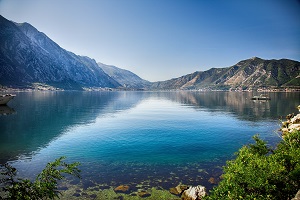
Today, the Republic of Montenegro officially becomes the 27th Party to the Protocol on Water and Health, thus joining countries effectively working together within the framework of the Protocol to accelerate action on sustainable management of water resources and improve health and well-being for all.
The Protocol on Water and Health, jointly serviced by the United Nations Economic Commission for Europe (UNECE) and the World Health Organization (WHO) Regional Office for Europe, is an international legally binding agreement available to countries in the pan-European region.
The main aim of the Protocol is to protect human health and well-being by better water management, including the protection of water ecosystems, and by preventing, controlling and reducing water-related diseases. The Protocol is the first international agreement of its kind adopted specifically to attain an adequate supply of safe drinking water and adequate sanitation for everyone, and effectively protect water used as a source of drinking water.
The aims and areas of action of the Protocol are aligned with Montenegro’s strategic priorities in the area of water, sanitation and health. In particular, the Protocol will support Montenegro in its efforts to tackle the challenge of increasing resilience of water and sanitation infrastructure to climate change. In his statement to the 5th session of the Meeting of the Parties to the Protocol (Belgrade, 19-21 November 2019), the Minister of Health of Montenegro, H.E. Mr. Kenan Hrapović, explained that the country experiences extreme weather events such as floods and landslides, which may impact on water safety and/or the integrity of sanitation systems. Furthermore, during the summer, the country can face challenges related to water scarcity, which are compounded by high water demand during the tourist season and by the increasing effects of climate change. According to the Minister, “through implementation of the Protocol, we not only aim to strengthen the climate-resilience of our water supply and sanitation services and promote sustainable water management, but also to promote universal and equitable access to water, sanitation and hygiene in all settings”.
Accession to the Protocol by Montenegro was promoted by the Iceland Statement, adopted at the 5th high-level meeting of the WHO small country initiative (Reykjavik, 26–27 June 2018), and by which Montenegro and ten other countries of the WHO European region committed to accede to the Protocol by 2022.
Based on the experience of Parties, accession to the Protocol brings many advantages. The Protocol provides a unique legal and institutional framework to implement the vision of the 2030 Agenda through bringing together the environment and health communities and supporting the strengthening of policies and institutional mechanisms at national level. It also helps countries to translate into practice the human rights to safe drinking water and sanitation.
In his opening video message to the fifth session of the Meeting of the Parties, the Secretary-General of the United Nations called on all countries of the UNECE region to accede to the Protocol and strive for its full implementation, supporting their concrete efforts as we enter the Decade of Action to deliver on the Sustainable Development Goals by 2030. At this session, seven other countries reported that they are in the process of accession.
For more information see “Protocol on Water and Health and the 2030 Agenda: A Practical Guide for Joint Implementation” and visit: http://www.unece.org/env/water.html

